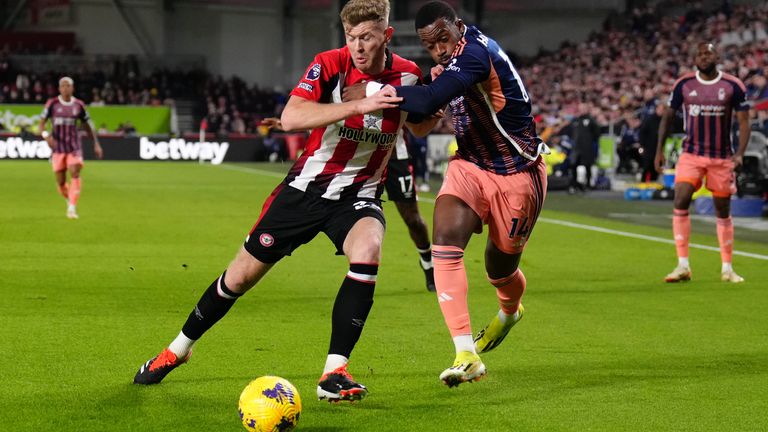Callum Hudson-Odoi is weary recounting the racism.
They are painful memories – of abuse playing for England and Chelsea, and too often online – that the Nottingham Forest winger would rather forget.
But speaking up is about ensuring the next generation of black players can, hopefully, just focus on football without facing hate in their place of work.
“It’s very frustrating,” Hudson-Odoi told Sky News. “It’s more anger and disappointment, if anything.
“I think for the fact that it just keeps happening and the amount of times I think players and staff and everybody has spoken about it, about trying to stop the whole situation in general.
“I think it’s annoying to hear that things are still happening and situations occur and people think it’s right to say some things and do certain chants.”
The 23-year-old had just emerged from a summit of players past and present along with academics convened by Forest to form a call for action to demand change.
He sat with teammates for hours listening to how prejudice can still be a barrier to a safe sport.
Thierry Henry spoke of the history of black people being marginalised by society.
His fellow France 1998 World Cup winner, Lilian Thuram, told of how too often the responsibility falls on black players to eradicate racism and how institutions don’t want to change.
The global governing bodies can react to particular incidents with tough talk – as happened earlier this month after the racist abuse of AC Milan goalkeeper Mike Maignan by Udinese fans sparked a player walk-off.
“When you hear something like that you don’t want to be playing anymore,” Hudson-Odoi said.
“All you’re trying to do is just play the game and be happy and try and get a result for the team. So I think for us it hurts a lot of the time.
“And I think sometimes the referees could do more and say, ‘OK look you have to stop the game’, abandon the game, get the fans out of the stadium who have done it.
“Or some of the players taking a gesture to help to understand that, ‘Listen, we’re not playing no more. We’re not doing this until some things are done’.”
Read more:
First black referee in Premier League for 15 years
Football racist abuse should trigger automatic match forfeit
Beyond statements of outrage, the trail from FIFA can go quiet – which is partly why players gathered at Forest’s County Ground on Wednesday.
So often football authorities say the solution is better education – without specifying where the responsibility for that rests.
Hudson-Odoi would face racist fans
Hudson-Odoi would confront racist fans face to face one day.
“I think I would want to ask the question of why,” he said. “What made you do that? What made you say that? What’s the reason why you’re being racist. Do you get a joke out of it? Is it a laugh?”
It’s not just about trying to understand their warped motives but for them to know the impact of their toxic actions.
“I think your mentality really just goes because of the fact that you feel ashamed,” Hudson-Odoi said. “You feel kind of embarrassed and you don’t feel yourself on the pitch.”
And by speaking out, Hudson-Odoi hopes player activism can make football safer.
“For the next generation that will come up after us… I think they’re going to come up and see everything and be like, ‘OK, yeah, they’ve done a lot in their time to make sure that everything that we have now is not the same as they faced,” he said.
“So hopefully what we’ll do now benefits them for when they’re coming up.”
There is an optimistic vision from Hudson-Odoi as the interview closes: “That we can play football being free and happier.”

